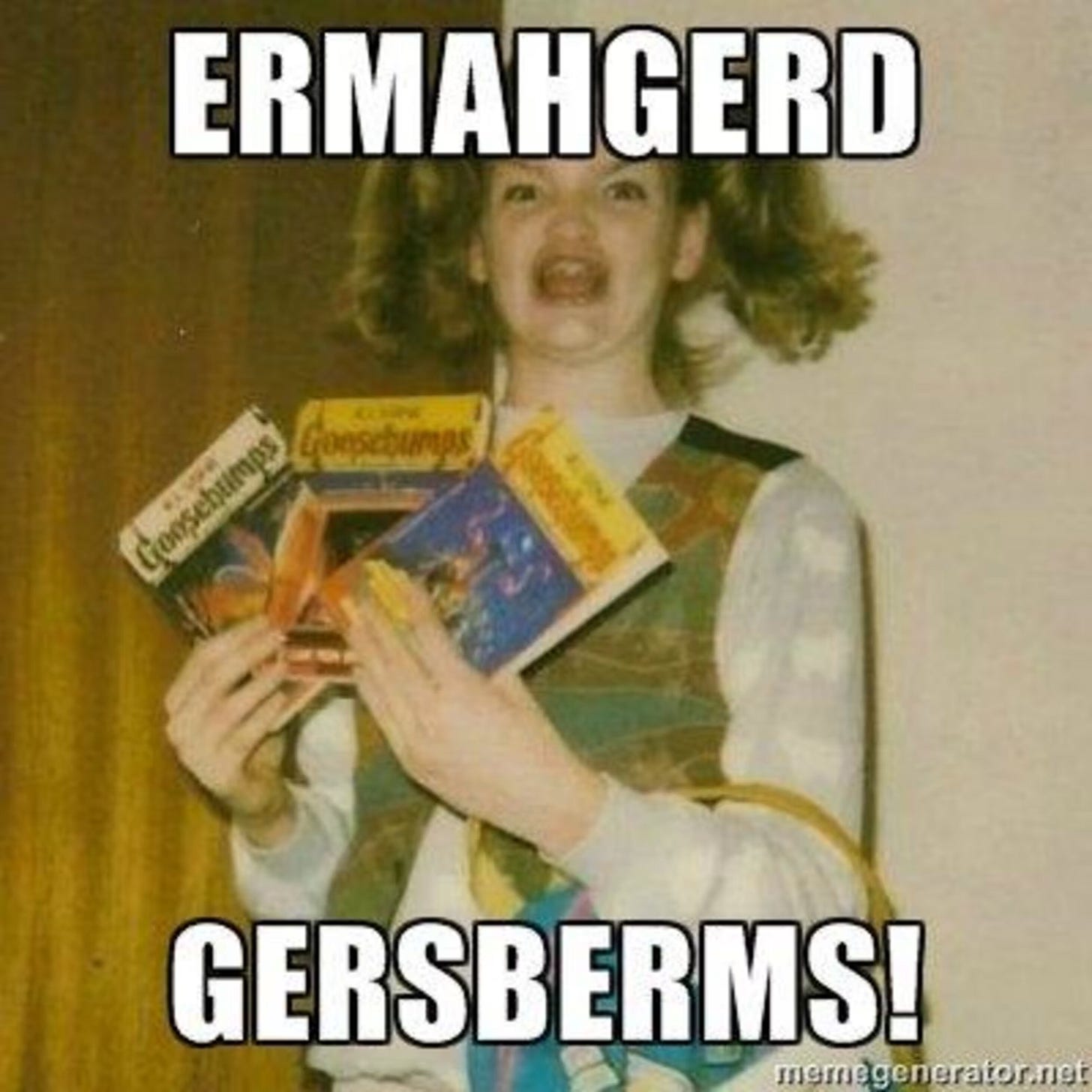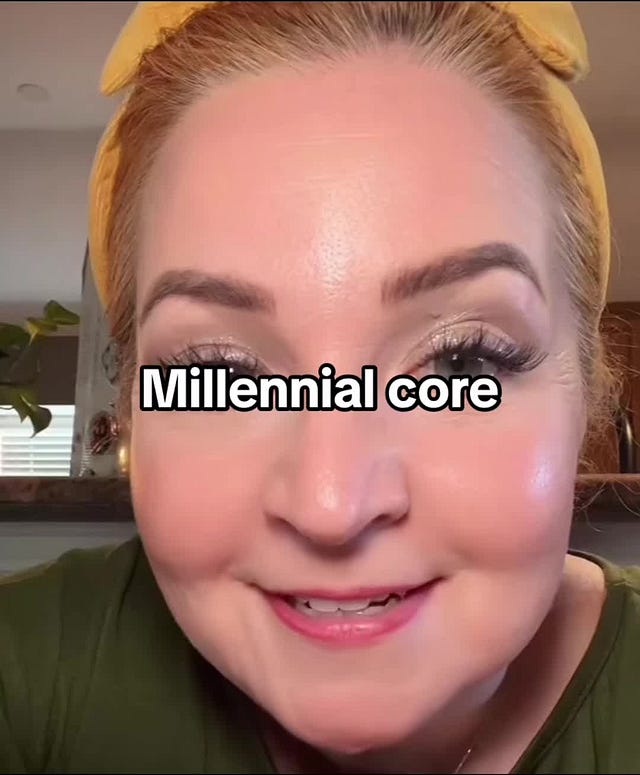from 'ermahgerd' to 'muahaha:' how millenial humor got so cringe
I promise I’m not here to tease you. At least not before you've had your coffee xx
Sometime around 2012, an image of a woman surfaced on Reddit, her smile flat and square with excitement, holding up a few copies of the Goosebumps series. “Gersberms,” the photo was captioned. “Ermahgerd,” another responded in the thread.
“Ermahgerd” became one of those memes that went on to totally eclipse an era on the internet. There was a brief but golden time in school where the funniest thing you could say was a well-timed “ermahgerd.” It was just silly and random and a little absurd. In fact, much of 2010s internet memes relied heavily on voice modulations, whether it be the “ermahgerd” kind of rhotacization, the scrambled childlike grammar of Miranda Sings and dogespeak, or the pitch modifications of Annoying Orange, Bed Intruder and Taylor Swift’s “I Knew You Were Trouble (Goat Version).”
Much of this humor was reflected in the starry-eyed optimism sweeping the decade at large. It was the time when the representational politics of Barack Obama waffled into an idea of “post-racial” America, when Sophia Amoruso’s #Girlboss feminism had women power-posing in pantsuits and dreaming of climbing the corporate ladder, and when the gay rights movement was finally making great strides — with same-sex marriage finally being federally legalized in America, Australia, England and Wales. In reflection, the humor was often embedded with this hope: self-infantilizing, wholesome, and most importantly, playful.
Over the past few months, however, millennial core videos have gone viral online, compiling clips of white thirty-somethings into videos with pensive music, teasing them for their geriatric behaviors — specifically, doing shit aligned with the “ermahgerd” era. There’s that one woman calling herself a 28-year-old toddler as she fumbles dramatically with a cup. There’s the other girl shrieking aloud after buying a cheese grater at the restaurant. Or my personal favorite, ah’ve gort mah caurffee, nauwr let us discuss. “Millennial core never fails to make me feel physically ill ❤️,” one wrote. “why are all millennials theatre kids,” another said.
 Tiktok failed to load.
Tiktok failed to load.Enable 3rd party cookies or use another browser
The thing is, there’s nothing inherently wrong with this brand of quirky humor. It’s not morally outrageous, to have a cheese obsession, or call Taylor Swift a “smol gorl,” or dance when a plate of pancakes is set in front of you. It’s not offensive, or appropriative, or mean. So why is it that when a millennial says “kickass” now, I feel a fight-or-flight reflex rise so quickly in my body that you would think I was being hunted down?
While there is always an instinct for Younger People to make fun of Older People, that’s not really what this is. Millennial core does not tease your affinity for skinny jeans, or your dramatic side part. It doesn’t make fun of Iggy Azalea’s “Fancy (feat. Charli XCX)” or the Ice Bucket Challenge or any other viral phenomenon of that time. What it does make fun of is the kind of basic white girl humor that became larger than itself — the kind of humor that became a symbol of the pumpkin spice latte-drinking, suede skirt-wearing, sanitized girlboss neoliberalism that was a throughline in a lot of the ways corporations and bodies of power tried to appeal to us.
Much of this kind of humor is coded in privilege. White women putting on voices where the punchline is ultimately babying themselves. The premises of these jokes are also usually pretty divorced from the context of the world. There’s nothing topical about excitement expressed loudly over small, interpersonal happenings. But comedy is about telling the truth, or however that Richard Pryor quote goes. What greater truth do these jokes speak to? And as time went on, millennial humor became a stark reminder of the blithe naivete that was peddled to us on the internet at the time, and how spectacularly it has failed us since.
Because while these white women were shrieking about cheese graters in restaurants and muahaha-ing into their sandwiches, the T-Mobile sponsored rainbow-veiled hope of millennial politics unravelled right in front of our very eyes.
Lean In, #Girlboss feminism has proven to do fuck all for women’s rights. The gender pay gap has not moved. American abortion rights are being rolled back. Convicted human trafficker slash alpha male podcaster Andrew Tate became more of a recognizable name to British teenage boys than Prime Minister Rishi Sunak. Obama’s era of DEI&B also proved to be a false salve for disenfranchised people: not only are those very gay rights strides in danger, but people of color and queer communities still targeted and discriminated against, and companies are now also actively gutting the platforms first set up to empower them. Pink pussy hats and “voting blue no matter who” did not do anything to solve our day-to-day struggles of living. Joe Biden ate ice cream while pretending to have an answer about a ceasefire in Palestine (which is a top-tier callous move, and I still cannot shake the fact that he tried to be quirky while discussing his role in a genocide). Even the very nature of silly, wholesome jokes proved to be inescapable from its context as many creators that rose to prominence for this kind of humor began facing public backlash for inappropriate behavior behind the scenes.
Note: There’s also the cultural aspect to consider — internet culture was in its nascent stages, unlike now, where many memes require an understanding of prior memes in order to really get the joke. Any community develops a familect to mark each other as part of the in-crowd. But as more people logged on, the language had to push forward, in order for those people who get it, to get it (e.g. are you on social media, or are you chronically online.)
That’s what’s so cringe about millennial humor. What it represents, not the jokes themselves. Optimism feels vapid and ignorant in this day and age, and our hindsight makes the millennial brand of carefreeness feel like a mockable offence. Still, it’s important not to generalize. You can’t blame every millennial for those Photoshopped images of, like, John Lewis and John McCain holding hands in heaven that got passed around on Facebook like chlamydia. Just as not everyone in the sixties was a Beatnik, not every millennial is a brain-farting, awko-taco, swagalicious studmuffin. Much of this humor even persists today: Skibidi Toilet, glizzies and MulchTok are enduring proof of the internet’s desire for random, silly shit, only adjusted to better fit the current climate — a bit more visual, a bit more apocalyptic.
No one wants to be in a hysterical generational debate with anyone in this current climate. But millennial core is not about making fun of individual millennials. We aren’t coming for your infinity scarves by pointing out the souring of a humor as time has gone on. I mean, the millennial pause, that’s teasing you. I promise I’m not here to tease you. At least not until you’ve had your coffee.
who wrote this?
Steffi Cao is a culture writer based in Brooklyn. Her work has appeared in The Atlantic, BuzzFeed News, Forbes, CNN, Glamour and more. Her newsletter, it’s steffi, answers questions about living in the social media age, and has appeared on NPR. You can follow her on Instagram @stefficao or on Twitter/TikTok @stefficao_.
want to be published in culture vulture?
if you’re a pop culture/ internet writer and you feel like you’ve got something to say that fits with our culture vulture vibe, send me a draft to luce@shityoushouldcareabout.com and I’ll see what I can do 𓆩♡𓆪









I was with you until I actually had to pause at this sentence which seemed to veer completely off the course I was expecting: "What it does make fun of is the kind of basic white girl humor that became larger than itself." As a Millennial I can tell you that the bulk of this humor was actually piloted by BOYS. Ermagerd, I Can Has Cheezburger, Dogespeak, all created by men. I get that you see white women doing this on tiktok now but it's still soooooo weird of this article to frame its argument around girlboss this and that when most of this annoying jargon came from 4chan, the most misogynistic place on the internet, or reddit, which is not all that better. The internet was always mean.
"While there is always an instinct for Younger People to make fun of Older People, that’s not really what this is."
It's a more than a bit of that, though, isn't it? Generational difference is a constant - one which every generation gets to discover anew. See Punk as to Hippy - same same but different.